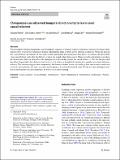Files in this item
Chimpanzees use observed temporal directionality to learn novel causal relations
Item metadata
| dc.contributor.author | Tennie, Claudio | |
| dc.contributor.author | Voelter, Christoph J. | |
| dc.contributor.author | Vonau, Victoria | |
| dc.contributor.author | Hanus, Daniel | |
| dc.contributor.author | Call, Josep | |
| dc.contributor.author | Tomasello, Michael | |
| dc.date.accessioned | 2019-09-24T10:30:10Z | |
| dc.date.available | 2019-09-24T10:30:10Z | |
| dc.date.issued | 2019-09-23 | |
| dc.identifier | 261103642 | |
| dc.identifier | 165d1e6e-3a19-4b7f-ae85-5c3b52008b7b | |
| dc.identifier | 85073980829 | |
| dc.identifier | 000494402100002 | |
| dc.identifier.citation | Tennie , C , Voelter , C J , Vonau , V , Hanus , D , Call , J & Tomasello , M 2019 , ' Chimpanzees use observed temporal directionality to learn novel causal relations ' , Primates , vol. First Online . https://doi.org/10.1007/s10329-019-00754-9 | en |
| dc.identifier.issn | 0032-8332 | |
| dc.identifier.other | ORCID: /0000-0002-8597-8336/work/62311838 | |
| dc.identifier.uri | https://hdl.handle.net/10023/18544 | |
| dc.description.abstract | We investigated whether chimpanzees use the temporal sequence of external events to determine causation. Seventeen chimpanzees (Pan troglodytes) witnessed a human experimenter press a button in two different conditions. When she pressed the “causal button” the delivery of juice and a sound immediately followed (cause-then-effect). In contrast, she pressed the “non-causal button” only after the delivery of juice and sound (effect-then-cause). When given the opportunity to produce the desired juice delivery themselves, the chimpanzees preferentially pressed the causal button, i.e., the one that preceded the effect. Importantly, they did so in their first test trial and even though both buttons were equally associated with juice delivery. This outcome suggests that chimpanzees, like human children, do not rely solely on their own actions to make use of novel causal relations, but they can learn causal sequences based on observation alone. We discuss these findings in relation to the literature on causal inferences as well as associative learning. | |
| dc.format.extent | 8 | |
| dc.format.extent | 886717 | |
| dc.language.iso | eng | |
| dc.relation.ispartof | Primates | en |
| dc.subject | Causal cognition | en |
| dc.subject | Social learning | en |
| dc.subject | Chimpanzees | en |
| dc.subject | Action representation | en |
| dc.subject | Simultaneous conditioning | en |
| dc.subject | Primate cognition | en |
| dc.subject | BF Psychology | en |
| dc.subject | DAS | en |
| dc.subject.lcc | BF | en |
| dc.title | Chimpanzees use observed temporal directionality to learn novel causal relations | en |
| dc.type | Journal article | en |
| dc.contributor.institution | University of St Andrews. School of Psychology and Neuroscience | en |
| dc.contributor.institution | University of St Andrews. Centre for Social Learning & Cognitive Evolution | en |
| dc.identifier.doi | https://doi.org/10.1007/s10329-019-00754-9 | |
| dc.description.status | Peer reviewed | en |
This item appears in the following Collection(s)
Items in the St Andrews Research Repository are protected by copyright, with all rights reserved, unless otherwise indicated.

